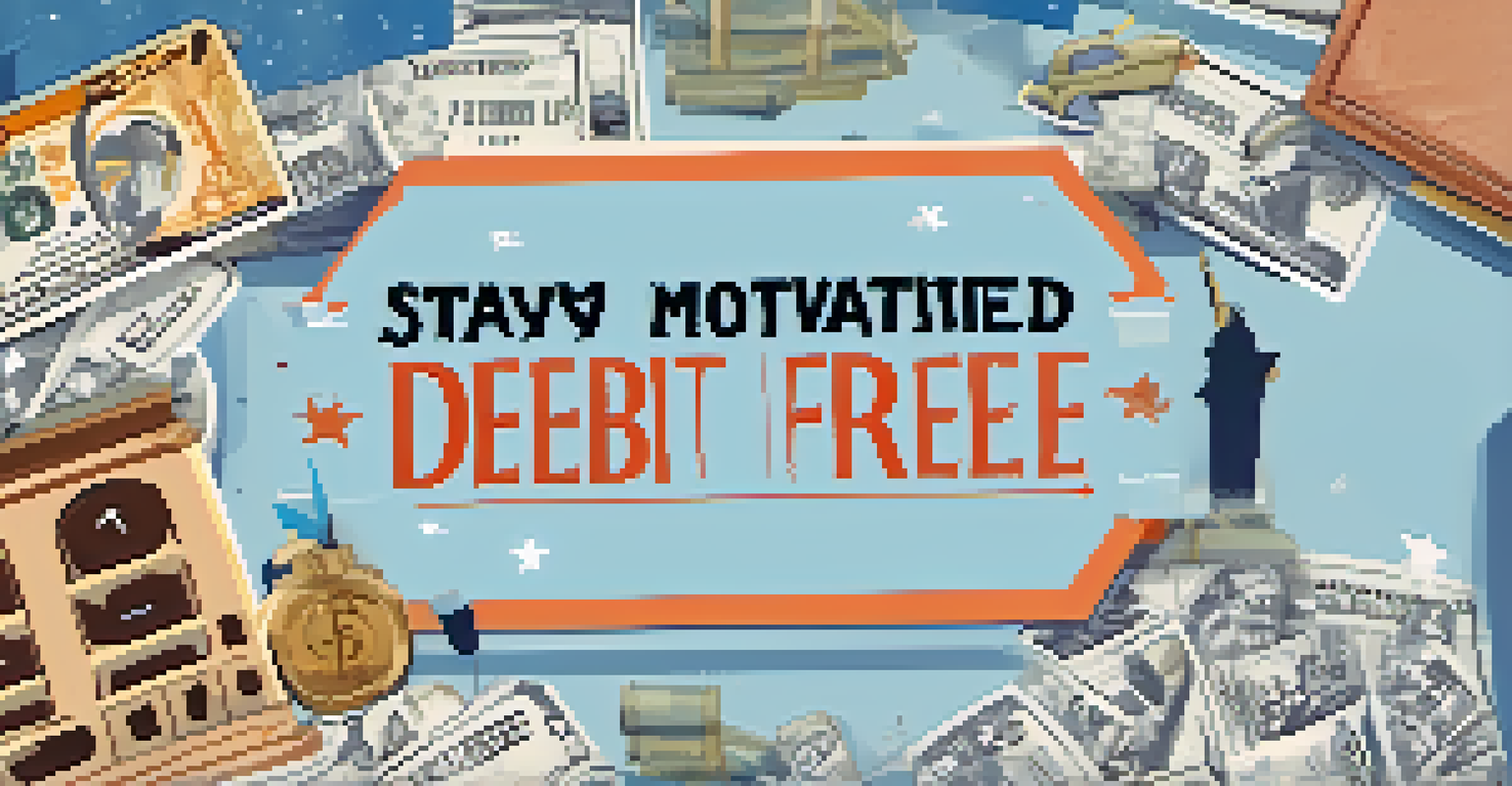Navigating Debt: Strategies for Effective Financial Management

Understanding the Types of Debt You May Face
Debt can feel overwhelming, especially when you don't fully understand it. Generally, debt falls into two categories: secured and unsecured. Secured debt, like mortgages, is backed by collateral, meaning if you default, the lender can take your asset. Unsecured debt, such as credit card debt, doesn’t have collateral, which can lead to more severe consequences if not managed properly.
The only way to get out of debt is to pay it off.
Knowing the types of debt you have is crucial for creating a plan to tackle it. For instance, if you have high-interest unsecured debt, it might make sense to prioritize paying that off first. Conversely, secured debts often have lower interest rates, but they still require careful attention. By categorizing your debts, you can better strategize your repayment plan.
Understanding your debt landscape is the first step toward effective financial management. It empowers you to take control rather than let the debt control you. With this knowledge, you can make informed decisions about budgeting, repayment strategies, and even your future financial goals.
Creating a Realistic Budget to Manage Debt
A well-structured budget is your roadmap to financial freedom. Begin by listing your income and all your expenses, which helps you see where your money is going each month. Be honest about your spending habits; this is not the time for sugarcoating. Once you have a clear picture, you can identify areas to cut back and allocate more toward debt repayment.

Consider using the 50/30/20 rule as a starting point for budgeting. This rule suggests that 50% of your income goes to necessities, 30% to discretionary spending, and 20% to savings and debt repayment. Adjust these percentages based on your unique financial situation, especially if you’re focusing on debt elimination. The key is to ensure that your budget aligns with your financial goals.
Understand Your Debt Types
Identifying whether your debts are secured or unsecured is crucial for effective financial management and repayment planning.
As you track your spending and stick to your budget, you’ll likely find it easier to manage your debt. This disciplined approach not only helps you pay down what you owe but also allows you to build positive financial habits that can serve you well in the future.
Exploring Debt Repayment Strategies That Work
When it comes to repaying debt, there are a couple of popular strategies to consider: the snowball method and the avalanche method. The snowball method suggests you pay off your smallest debts first to build momentum and motivation. Meanwhile, the avalanche method focuses on paying off debts with the highest interest rates first, ultimately saving you money on interest in the long run.
A budget is telling your money where to go instead of wondering where it went.
Choosing the right strategy often depends on your personality and financial situation. If you need quick wins to stay motivated, the snowball method might be more effective. On the other hand, if your goal is to minimize costs associated with interest, the avalanche method could be the way to go. Both approaches can lead to debt-free living; it’s about finding what works best for you.
Whichever method you choose, consistency is key. Make it a habit to regularly contribute to your debt repayment, and celebrate small victories along the way. This not only keeps you motivated but also reinforces positive financial behaviors that can benefit you in the long term.
The Importance of Building an Emergency Fund
While it may seem counterintuitive to save while in debt, having an emergency fund is crucial. Life is unpredictable, and unexpected expenses can crop up at any moment. By setting aside a small amount each month, you can create a financial cushion that prevents you from going deeper into debt when emergencies arise.
A good rule of thumb is to aim for three to six months of living expenses in your emergency fund. This may take time, especially if you’re focused on debt repayment, but even starting with a small goal can make a difference. For instance, consider saving just $500 as a starter fund; it’s a manageable amount that can cover minor emergencies and keep your debt repayment plan on track.
Create a Budget for Debt Relief
A well-structured budget, such as the 50/30/20 rule, helps you allocate resources to cut expenses and prioritize debt repayment.
Building an emergency fund not only protects you from unforeseen expenses but also provides peace of mind. Knowing you have a safety net can reduce financial anxiety and allow you to focus on your larger goal of becoming debt-free.
When to Seek Professional Financial Help
Sometimes, navigating debt can feel like a daunting task, and that’s okay—there's no shame in seeking help. If you find yourself overwhelmed by your financial situation, consider consulting with a financial advisor or credit counselor. These professionals can provide personalized guidance tailored to your specific needs and circumstances.
Look for certified professionals who have a good reputation and experience in debt management. They can help you create a realistic plan, negotiate with creditors, and even provide resources for debt consolidation if necessary. Remember, asking for help is a sign of strength, not weakness.
Professional help can offer clarity and direction when you’re feeling lost. By collaborating with an expert, you can regain control over your finances and work toward a more stable and secure financial future.
The Role of Credit Scores in Managing Debt
Your credit score plays a significant role in your financial life, especially when it comes to managing debt. Lenders use this three-digit number to assess your creditworthiness, and a higher score can lead to better interest rates and loan terms. Understanding how your credit score is calculated can empower you to make informed decisions about managing your debt.
Factors that influence your credit score include payment history, credit utilization, and the length of your credit history. Paying your bills on time and keeping your credit utilization below 30% are simple yet effective ways to boost your score. Regularly checking your credit report for errors can also help you maintain a healthy credit profile.
Build an Emergency Fund
Establishing an emergency fund is vital to avoid further debt during unexpected financial challenges while you're repaying existing debts.
Improving your credit score not only aids in debt management but can also open doors to future financial opportunities. Whether you’re looking to buy a home or secure a lower interest rate on a loan, a good credit score can be your ticket to greater financial flexibility.
Staying Motivated on Your Debt-Free Journey
Managing debt is a marathon, not a sprint, and staying motivated is key to reaching the finish line. One effective way to maintain your momentum is to set specific, achievable goals. For example, instead of saying, 'I want to be debt-free,' break that down into smaller milestones, such as paying off one credit card or reaching a certain savings amount.
Tracking your progress can also keep you motivated. Consider using a debt repayment tracker or a simple spreadsheet to visualize your journey. Celebrating small victories along the way can boost your morale and remind you of the progress you’ve made, reinforcing the positive habits you’ve established.

Surrounding yourself with supportive individuals can also make a significant difference. Share your goals with friends or family who can offer encouragement and accountability. Remember, every step you take toward managing your debt is a step closer to financial freedom.